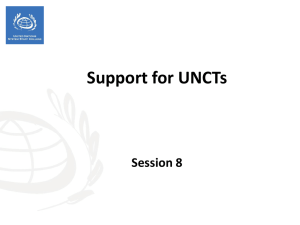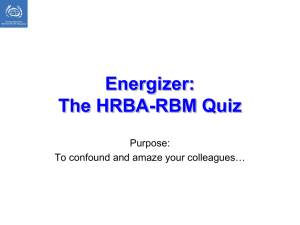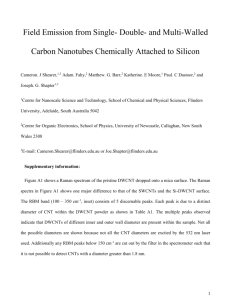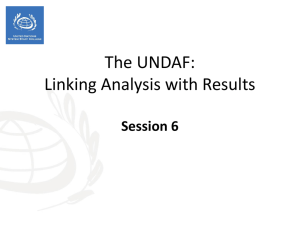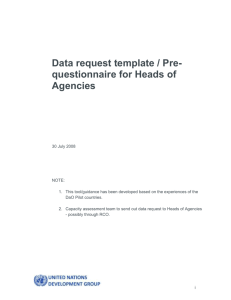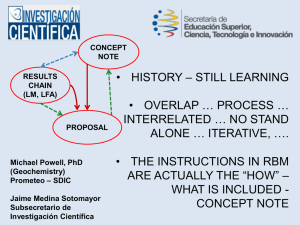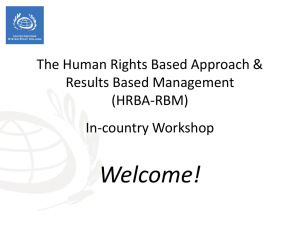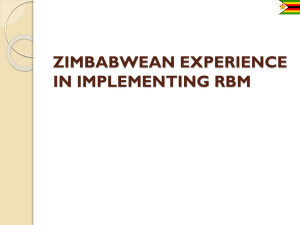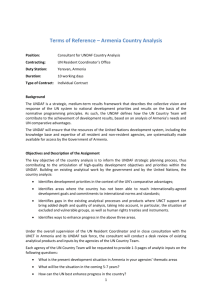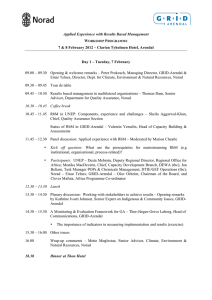RBM Action Plan
advertisement
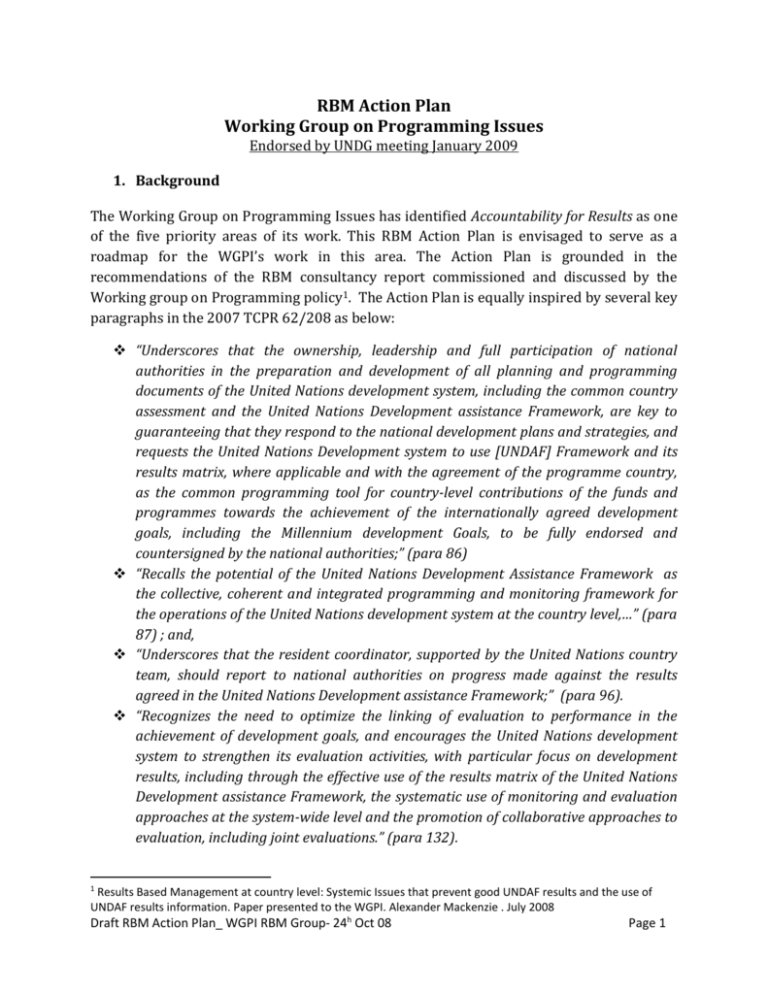
RBM Action Plan Working Group on Programming Issues Endorsed by UNDG meeting January 2009 1. Background The Working Group on Programming Issues has identified Accountability for Results as one of the five priority areas of its work. This RBM Action Plan is envisaged to serve as a roadmap for the WGPI’s work in this area. The Action Plan is grounded in the recommendations of the RBM consultancy report commissioned and discussed by the Working group on Programming policy1. The Action Plan is equally inspired by several key paragraphs in the 2007 TCPR 62/208 as below: “Underscores that the ownership, leadership and full participation of national authorities in the preparation and development of all planning and programming documents of the United Nations development system, including the common country assessment and the United Nations Development assistance Framework, are key to guaranteeing that they respond to the national development plans and strategies, and requests the United Nations Development system to use [UNDAF] Framework and its results matrix, where applicable and with the agreement of the programme country, as the common programming tool for country-level contributions of the funds and programmes towards the achievement of the internationally agreed development goals, including the Millennium development Goals, to be fully endorsed and countersigned by the national authorities;” (para 86) “Recalls the potential of the United Nations Development Assistance Framework as the collective, coherent and integrated programming and monitoring framework for the operations of the United Nations development system at the country level,…” (para 87) ; and, “Underscores that the resident coordinator, supported by the United Nations country team, should report to national authorities on progress made against the results agreed in the United Nations Development assistance Framework;” (para 96). “Recognizes the need to optimize the linking of evaluation to performance in the achievement of development goals, and encourages the United Nations development system to strengthen its evaluation activities, with particular focus on development results, including through the effective use of the results matrix of the United Nations Development assistance Framework, the systematic use of monitoring and evaluation approaches at the system-wide level and the promotion of collaborative approaches to evaluation, including joint evaluations.” (para 132). 1 Results Based Management at country level: Systemic Issues that prevent good UNDAF results and the use of UNDAF results information. Paper presented to the WGPI. Alexander Mackenzie . July 2008 Draft RBM Action Plan_ WGPI RBM Group- 24h Oct 08 Page 1 2. RBM Action Plan The RBM action plan is based on the recommendations of the TCPR 62/208 and the issues and priorities discussed by the WGPI. The Plan identifies the following 3 focus areas: RBM Capacity Development Results Reporting Accountability for Results 2.1 RBM Capacity Development: The WGPI expressed the need to move forward urgently in the area of capacity development. The matrix below describes the five key initiatives for capacity development identified by the group. These include prioritizing development of a common UN RBM manual, learning materials for training country teams and strengthening regional support to national capacity development. Focus Area 1: RBM Capacity Development Description 1.1 Develop one UN wide RBM Manual providing UN agreed common approach, common principles and terminologies Expected Outputs/Results Common UN RBM Manual 1.2 Individual agencies to update revise agency-specific RBM manuals and guides to ensure that they use the common UN –wide results terminologies and measurement architecture based on the agreements in the common UN RBM manual. Update to also harmonize terminology, distinguish between UNDAF outcomes and agency outcomes, as per the 2007 UNDAF guidelines, recognize the emerging trend for agency outcomes to be shared between 2 or more UN agencies; Agency RBM manuals and guidelines to comply with the principles of human rights based approach as per common understanding. Individual agency RBM manuals updated in line with the UNDG agreed manual 1.3 Inter-Agency RBM training tools/package: Following agreement on the common RBM manual, a package of RBM training tools will be developed/updated for conduct of RBM inter-agency trainings. Appropriate agencies such as the UN Staff college, Regional interagency teams and others will be explored as training of trainers to rolls out strengthening RBM at country level. RBM training tools and package to be endorsed as well as harmonized with trainings being conducted by individual agencies. The focus should emphasize both planning and the use of results information to assist decision making by the UNCT and implementing partners. RBM training tools and training package developed and endorsed by WGPI 1.4 RBM Training: The RC induction training and training of Representatives and Deputies, UNFAD rollout countries all need an element or session on managing for UNDAF outcomes. This would help generate greater leadership at RBM module included in RC induction training Draft RBM Action Plan_ WGPI RBM Group- 24h Oct 08 Agency Representatives Page 2 the country level and help create greater demand for information about UNDAF results. 1.5 Regional Support for RBM capacity development to UNCTs: Review gaps and constraints in the current Regional PSG ( peer support groups) support to national RBM capacity development to strengthen the mechanism. Consultation with RDTs/PSGs to develop regional plans to help UNCTs on an ongoing basis on managing for results. training to include session on managing for UNDAF outcomes (besides agency specific results) Regional mechanisms for building national RBM capacity developed with RDTs as part of overall support to the UNDAF process 2.2 Results Reporting: In line with the TCPR 62/208 emphasis on results as well as the responsibility of the RC to report to national authorities on the progress made against results agreed in the UNDAF, there is need to strengthen results reporting. The second area of the action plan focuses on this aspect. Focus Area 2: Results Reporting Description 2.1 Resident Coordinators Annual Report: Clarify the focus of the RCAR and update the guidelines for annual reporting in full consultation with all agencies. This is beyond the programming working group and is to be undertaken via integrated effort with various inter-agency clusters. Expected Outputs/Results Revised RCAR guidelines 2.2 Revise guidelines for individual agency preparation of annual reports: Agency guidelines for preparation of annual reports need to be reviewed and adjusted towards generating results information that is usable by the UNCT and stakeholders. Their focus needs to be expanded to include how agency supported results are actually contributing to UNDAF outcomes, and to the achievement of national priorities ( besides meeting the reporting needs to their governance structures) Agency annual report guidelines revised to include contribution to UNDAF outcomes 2.3 Annual One UN progress report: As per the TCPR 2007 requirements, all UNCTs are mandated to report on the UNDAF progress to government counterparts on annual basis. Pilot and develop a prototype of one annual UN progress report. This should use the UNDAF M & E plan as its frame of reference, operationalize the role of UNDAF outcome groups, and help to aggregate results information from contributing agencies. Prototype for one UN progress report piloted in selected countries and experience reviewed for possible roll out plan 2.3Accountability for Results: Clarity on accountability for corporate results and UNDAF/Country results is the key issue emerging from the WGPI comments received on the RBM consultant’s report and recommendations. There is need to distinguish between and balance accountability for corporate results and UNDAF/Country results. This has implications for the accountability frameworks which are approved by the governing Draft RBM Action Plan_ WGPI RBM Group- 24h Oct 08 Page 3 boards of the individual agencies. Hence the action plan focuses on clarifying and developing common agreement on the accountability issue. Focus Area 3: Accountability for Results Description 3.1 Clarify agency accountabilities at country level: Agency contribution to UNDAF results is foremost for implementing RBM and UNDAF matrices need to clearly map out agency contributions to achieving specific UNDAF outcomes. The accountabilities of agencies at country level to report to the UNCT about agency results also need to be made clearer. For example, the accountability framework establishes that “The RC will have the responsibility to monitor implementation of the UNDAF and to report on UN agencies’ progress against their commitments”. But are agencies accountable for sharing results information with the RCO? Annex 6 in the 2007 UNDAF guidelines needs to establish clear agency accountability. Expected Outputs/Results Clarify agency accountabilities at country level including for reporting and include in the revised CCA/UNDAF guidelines 3.2 Agency accountability frameworks to also include contributions to UNDAF and country results: There is need for discussion among agencies, Funds and programmes about the need to distinguish between and balance accountability for corporate results and UNDAF/Country results. This should be positioned as UNDGs ongoing response to the Paris/Accra Declaration. Debate and develop a common agreement on accountability for UNDAF results for agency accountability frameworks There is need to figure out how to adjust current agency IT systems to balance the needs for UNDAF results information at country level with corporate results information at HQ level. Draft RBM Action Plan_ WGPI RBM Group- 24h Oct 08 (This has implications for the accountability frameworks which are approved by the governing boards of the individual agencies.) Page 4
